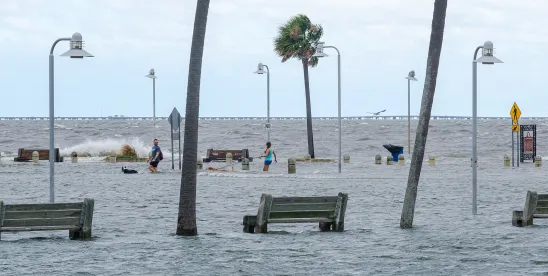As our community works to repair and rebuild our homes, businesses, and neighborhoods, we hope you find this information helpful.
REPAIR AND RESTORATION OF DAMAGED HOMES AND BUSINESSES
All jurisdictions in Tampa Bay require permits for both demolition and construction. While some remediation and restoration companies claim this is unnecessary, permits are generally required. Many jurisdictions allow after the fact permits with sufficient photographic evidence of the work performed to building code.
Why is this important?
- Property owners may not be able to obtain insurance in the future without evidence of proper repair.
- Avoid unprofessional and unsafe workmanship.
- Florida law requirement for flood disclosure in future sales per Fla Stat §689.302. either at or before the execution of the contract. The disclosure applies to all residential real property transactions, including new construction and condominiums, improved, and vacant land. Find more details about this new requirement here.
- Insurance providers and local governments appear to require inspections and the most likely replacement of electrical systems in a structure that has been exposed to water. Insurance companies may deny future coverage if certain electrical improvements are not made.
LIMITATIONS ON REPAIRS PER FEMA AND THE 50% RULE ("FEMA RULE")
- All Tampa Bay jurisdictions require completion of a Substantial Improvement/Substantial Damage Determination worksheet to verify compliance with the FEMA Rule. The FEMA 50% Rule can be found here.
- The FEMA Rule applies to all types of construction, including residential and commercial.
- The specific implementation of the FEMA Rule varies by jurisdiction. Your contractor should know the applicable rules in your jurisdiction.
- The FEMA Rule requires any structural repairs or improvements exceeding 50% of a structure’s market value to fully comply with current flood regulations and base flood elevations. The cost to repair a home (including demolition and debris removal) to its pre-storm condition may not exceed 50% of the pre-storm value of the structure.
- Most local governments use a cumulative approach for any permits issued within a one to five year period to determine the maximum amount an owner can spend. The cost to repair and cost of improvement includes the costs of all materials, labor, and other items necessary to perform the work – even if the work or materials is donated or not due to flood damage.
- Check the value of the structure at the Pinellas County, Hillsborough County, or Pasco County Property Appraiser sites.
PROPERTY TAX RELIEF FOR CATASTROPHIC EVENT PROPERTY DAMAGE
Residential dwellings rendered uninhabitable for at least 30 days due to Hurricane Helene or Milton may be eligible for a partial property tax refund. Applications for the refund can be made through your local County Property Appraiser. More information can be found on the Property Appraiser Website.
RESIDENTIAL LEASE TERMINATION
If you are a tenant with a residential lease for property which has been damaged, you may have rights to immediately terminate your lease pursuant to Florida State Statutes.
CONTRACTOR AWARENESS
Property owners and businesses are at increased risk of falling victim to unlicensed or uninsured contracting activities during disaster recovery efforts.
- All contractors must be licensed and insured.
- Ask any contractors to provide evidence of their licenses and insurance. Ask for evidence of both the type and amount of insurance.
- Check to see if a contractor is a member of a trade organization related to the work being performed.
- Check for references from friends and neighbors even if reviews are available online.
Roofing and tree removal are among the most common industries that see an uptick in scams following severe storms. Importantly, permits are required for most roofing repairs, tree removal, or trimming.
APPLYING FOR FEMA ASSISTANCE FOR LOSSES NOT COVERED BY INSURANCE
Information about how to apply for assistance with losses not covered by either Homeowners or Flood insurance can be accessed here: Home | FEMA.gov.





 />i
/>i

